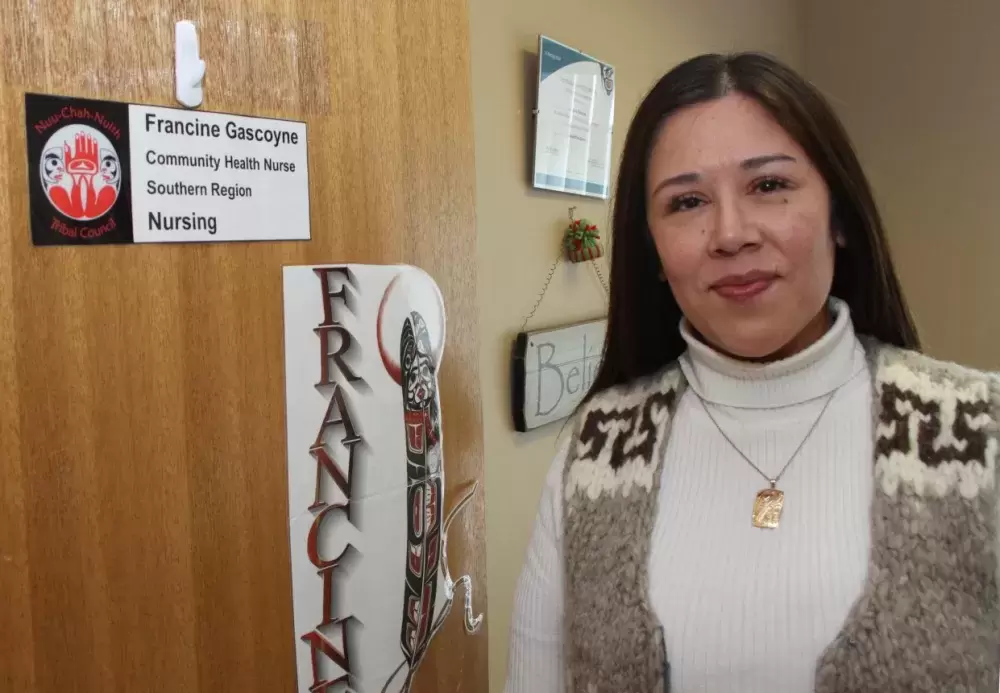In an effort to help with an overwhelmed HealthLink BC hotline and a worsening shortage of supplies to test for COVID-19, nurses are now available by telephone to guide Nuu-chah-nulth members through the crisis.
811 remains the primary hotline for those concerned they might have the coronavirus, but the HealthLink BC line has been ineffective for many who have been met with a “please try your call again later, or visit our website” message.
Now concerned Nuu-chah-nulth members can call Francine Gascoyne, NTC community health nurse clinical leader, at 250-735-0416, or Home Care Clinical Nurse Leader Catherine Gislason at 250-720-1763. The NTC nurses will be available 8 a.m. to 4:30 p.m. Monday to Friday as an alternative support when the HealthLink BC hotline is backlogged with calls.
The acute respiratory illness has spread rapidly around the world and in North America since it emerged from the Wuhan region of China in late 2019. Since March 9, confirmed cases have reached Vancouver Island, a number that climbed to 22 as of Thursday. Over March B.C.’s cases grew from less than 10 to 271, with seven deaths - seven of which occurred in North Vancouver’s Lynn Valley Care Home. There is no medical cure for COVID-19.
To mitigate the spread of the virus, people are advised to frequently wash their hands, disinfect surfaces that are regularly touched and keep a distance of about six feet from each other. Telephone help is particularly important due to the risk of spreading the virus, said Gascoyne.
“We’re also respecting the social distancing and right now for everyone to stay at home, so even we’re not in contact with our clients,” she said.
The NTC nurses are following information provided by federal and provincial health authorities, including the self assessment tool available online at covid19.thrive.health. Developed by the B.C. Ministry of Health, this tool alludes to the current lack of supplies needed to test for COVID-19, a shortage that has led authorities to even advise that those who show mild symptoms of the virus do not need to be tested.
“The B.C. Ministry of Health strongly urges anyone who has symptoms – including a fever, cough, sneezing, sore throat or difficulty breathing – to self isolate for 14 days,” states the self-assessment tool.
Those who should be tested include symptomatic people with respiratory issues requiring hospitalisation, health care workers indicating signs of COVID-19, residents of long-term care facilities and individuals affected by a cluster outbreak.
“If they’re experiencing even mild symptoms, then we will recommend stay home, self-isolate,” said Gascoyne, who hopes to help clarify signs of COVID-19 with Nuu-chah-nulth-aht. “For example, if a child has a runny nose, maybe a little bit of a cough, but if the child doesn’t have a high fever, then we can walk through that with them. We don’t want people running to emergency if they’re just experiencing mild symptoms.”
The social distancing precaution comes from difficulties in determining who actually has the virus. With at least 17,000 tests conducted in B.C., the province’s numbers are based on confirmed cases – yet the likelihood remains that many more have COVID-19 but have not been tested.
“At the end of this, once it settles, we’re not going to know all of the actual numbers of people that had the coronavirus,” said Gascoyne.
While the elderly and those with a compromised immune system are particularly vulnerable, children often appear to be able to carry the virus while showing mild symptoms. Parents are strongly urged to stay at home with their kids if youngsters exhibit symptoms.
“If you have an elderly person in the home, really try and be as proactive as you can,” said Gascoyne. “If your elderly loved one could potentially go stay with someone else - if there’s children that start coming down with a running nose, a bit of a fever and a bit of a cough - then take in those extra precautions.”
The NTC nurses are also advising those concerned to look to reliable sources of information, such as the First Nations Health Authority (fnha.ca), World Health Organisation (www.who.int), B.C. Centre for Communicable Disease Control (bccdc.ca), Health Canada (canada.ca/en/public-health.html) and the B.C. Ministry of Health (healthlinkbc.ca).
“There is a lot of misinformation and myths on Facebook,” said Gascoyne.







